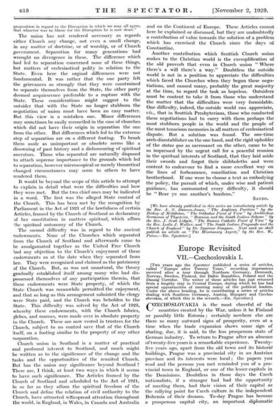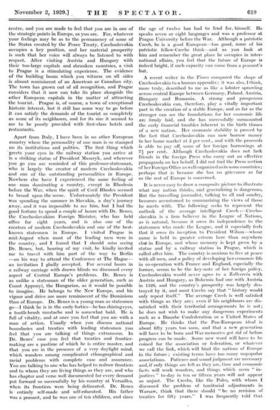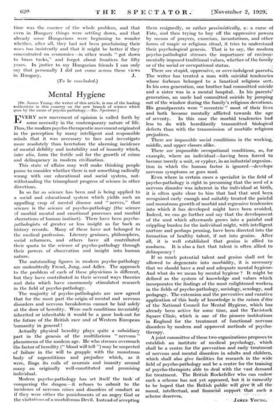Europe Revisited VII.—Czechoslovakia I.
[Two years ago the Spectator published a series of articles, called "Europe after Twenty Years," recording impressions received after a tour through Northern Germany, Denmark, Norway, Sweden, Finland, the Baltic Republics, Poland and the Danzig Corridor. The writer of these articles has just returned from a lengthy stay in Central Europe, during which he has had special opportunities of meeting many of the political leaders. Under the above heading, he is contributing a series of articles dealing with Southern Germany, Austria, Hungary and Czecho• slovakia, of which this is the seventh.—En. Spectator.]
CZECHOSLOVAKIA is the most cheerful of the countries created by thern War,- unless it be Finland or possibly little Estonia ; certainly nowhere else are there so many outward signs of prosperity, even at a time when the trade expansion shows some sign of abating, due, it is said, to the less prosperous state of German industry. To return to Prague after an absence of twenty-five years is a remarkable experience. Twenty- five years ago, apart from the old town and its historie buildings, Prague was a provincial city in an Austrian province and its interests were local ; the papers you read and the persons you met reminded you of a pro- vincial town in England, or one of the lesser capitals in the Dominions. Doubtless in those days the Czech nationalists, if a stranger had had the opportunity of meeting them, had their vision of their _ capital as the rallying point for Czech culture in the independent Bohemia of their dreams. To-day. Prague has become a prosperous capital city, an important ,diplomatic Centre, and you are made to feel that you are in one of the strategic points in Europe, as you are. For, whatever Your feelings may be as to the permanency of some of the States created by the Peace Treaty, Czechoslovakia occupies a key position, and her material prosperity is such that her voice will always be listened to with respect. After visiting Austria and Hungary with their too-large capitals and shrunken countries, a visit to Prague is a stimulating experience. The evidence of the building boom which you witness on all sides is - almost reminiscent of an American or Canadian city. The town has grown out of all recognition, and Prague considers that it now can take its place alongside the other European capitals in the matter of attracting the tourist. Prague is, of course, a town of exceptional historic interest, but it still has some way to go before it can satisfy the demands of the tourist as completely as some of its neighbours, and for its size it seemed to me to be poorly provided with first-class hotels and restaurants.
Apart from Italy, I have been in no other European country where the personality of one man is so stamped on its institutions and politics. The first thing which greets your eyes in the railway station you arrive at 3s a striking statue of President Masaryk, and wherever you go you are reminded of this professor-statesman, who is largely the creator of modern Czechoslovakia and one of the outstanding personalities in Europe. Nowhere else have I experienced the same feeling of one man dominating a country, except in Rhodesia before the War, when the spirit of Cecil Rhodes seemed to brood upon the scene. Unfortunately the President was spending the summer in Slovakia, a day's journey away, and it was impossible to see him, but I had the good fortune to spend a couple of hours with Dr. Benes, the Czechoslovakian Foreign Minister, who has held office for eight years, and is also one of the creators of modern Czechoslovakia and one of the best- known statesmen in Europe. I visited Prague in mid-August when most of the leading men were in the country, and I feared that I should miss seeing Dr. Benes, but, hearing of my visit, he kindly invited me to travel with him part of the way to Berlin —on his way to attend the Conference at The Hague— an invitation I gladly accepted. For several hours in a railway carriage with drawn blinds we discussed every aspect of Central Europe's problems. Dr. Benes is as unlike a statesman of the older generation, such as Count Apponyi, the Hungarian, as it would be possible to imagine. He belongs to the New Europe, and his vigour and drive are more reminiscent of the Dominions than of Europe. Dr. Benes is a young man as statesmen go—I think he is in the early forties—he has shining eyes, a tooth-brush mustache and is somewhat bald. He is full of vitality, and at once you feel that you are with a man of action. Usually when you discuss national boundaries and treaties with leading statesmen you feel that you are talking of things extraneous. In Benes' case you feel that treaties and frontier- making are a pastime of which he is entire master, and that you are in the presence of a very daylight mind, which wanders among complicated ethnographical and racial problems with complete ease and assurance. You are talking to one who has helped to redraw frontiers and to whom they are living things as they are, and who has chapter and verse well documented for every demand put forward so successfully by his country at Versailles, when its frontiers were being delineated. Dr. Benes is - entirely self-made and self-educated. His father was a peasant, and he was one of ten children, and since the age of twelve has had to fend for, himself. He speaks seven or eight languages and was a professor at Prague University before the War. Although a patriotic Czech, he is a good European—too good, some of his patriotic fellow-Czechs think—and as you look at him and remember the great place he occupies in inter- national affairs, you feel that the future of Europe is indeed bright, if such capacity can come from a peasant's hut.
A recent writer in the Times compared the shape of Czechoslovakia to a human appendix ;. it was also, I think, more truly, described to me as like a lobster sprawling across central Europe between Germany, Poland, Austria, Hungary and Rumania. A strong and prosperous Czechoslovakia can, therefore, play a vitally important part in the creation of a stable Europe, and as far as the stranger can see the foundations for her economic life are firmly laid, and she has successfully surmounted the early financial troubles inherent in the birth throes of a new nation. Her economic stability is proved by the fact that Czechoslovakia can now borrow money in her home market at 5 per cent., and with the proceeds is able to pay oft, some of her foreign borrowings at 7- per cent. Although Czechoslovakia does not lack friends in the foreign Press who carry out an effective propaganda on her behalf, I did not find the Press section of her Foreign Office as well-organized as in some countries; perhaps that is because she has no grievance as far as the rest of Europe is concerned.
It is never easy to draw a composite picture to illustrate what any nation thinks, and generalizing is dangerous. But the travelling journalist, talking to all and sundry, becomes accustomed to summarizing the views of those he meets with. The following seeks to represent the outlook of the average intelligent Czech :—Czecho- slovakia is a firm believer in the League of Nations, as is natural, because it owes its independence to the statesmen who made the League, and it especially feels that it owes its inception to President Wilson—whose name is held in greater esteem here than anywhere els411 in Europe, and whose memory is kept green by a statue and by a railway station in Prague, which is called after him. The country is anxious to live at peace with all men, and a policy of developing her economic life in co-operation with France and England, especially the former, seems to be the key-note of her foreign policy. Czechoslovakia would never agree to a Zollverein with Austria and Hungary, as Bohemia had one with Austria in 1526, and the country's prosperity was largely des- troyed by it, and most Czechs say that "history would only repeat itself." The average Czech is well satisfied with things as they are ; even if his neighbours are dis-- satisfied with their territorial arrangements he is not; he does not wish to make any dangerous experiments such as a Danube Confederation or a United States of Europe. He thinks that the Pan-European idea/ is about fifty years too soon, and that a new generation will have to be born and War memories got rid of before progress can be made. Some new word will have to be coined for the association or federation, or whatever we call the link, which will bind the nations of Europe in the future ; existing terms haVe too many unpopular associations. Patience and sound judgment are necessary and, if only things are left as they are, time and economic facts will work wonders, and things which seem " in- justices " to-day in ten or fifteen years will not appear so unjust. The Czechs, like the Poles, with whom I discussed the problem of territorial adjustments in Warsaw, think that there should "be no revision of treaties for fifty years." I was frequently told that time was the, essence of the whole problem, and .that even in Hungary things were settling down, and that already some Hungarians were beginning to wonder whether, after all, they had not been proclaiming their woes too insistently and that it might be better if they concentrated on economics—in other words "got down to brass tacks," and forgot about frontiers for fifty years. In justice to my . Hungarian friends I can only say that personally I did not come across these views (To be concluded.).










































 Previous page
Previous page